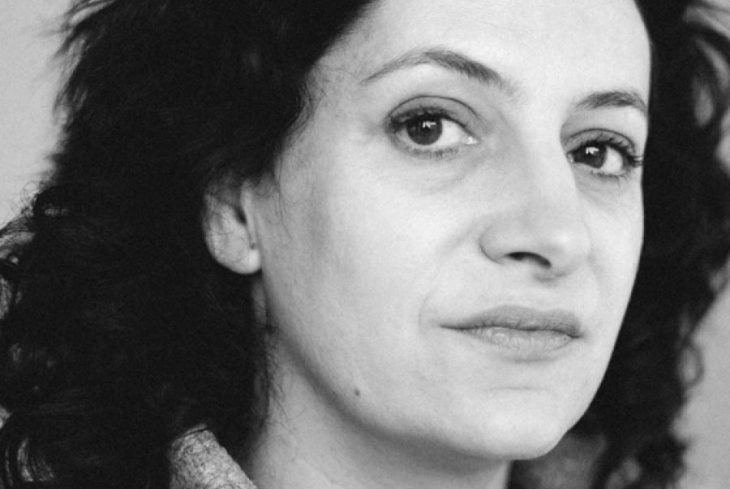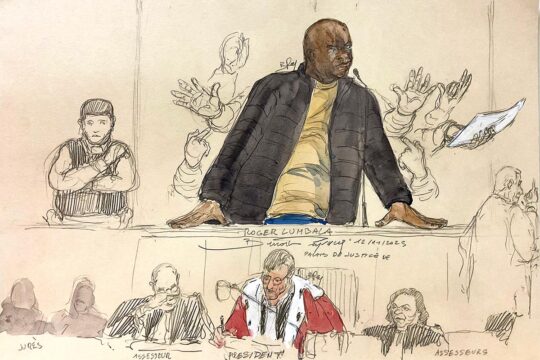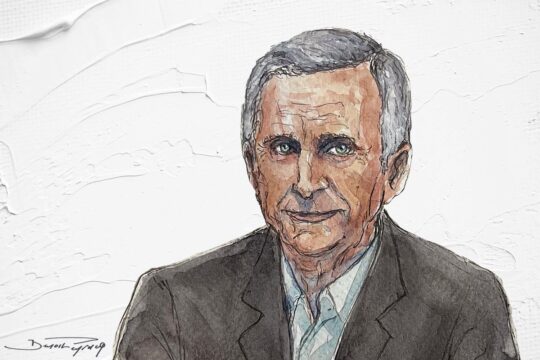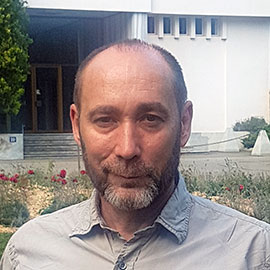JUSTICEINFO.NET IN-DEPTH INTERVIEWS
Céline Bardet
Director of the NGO We Are Not Weapons of War
The award of this year’s Nobel Peace Prize to Nadia Murad, a survivor of sexual slavery perpetrated on Yezidi women by Islamic State in Iraq, and Congolese surgeon Denis Mukwege, who has treated dozens of women raped in the context of eastern Congo’s conflicts, highlights once again the problem of sexual violence in wartime and the use of rape as a weapon of war. Lawyer Céline Bardet, founder of the NGO We Are Not Weapons of War (WWoW), has been working on these issues for two decades.
In this interview, conducted before and after the announcement of the Nobel prize, she talks about its importance, the recognition it represents for her friend Denis Mukwege and the potential risks it holds for the young Nadia Murad. She looks back at how courts have dealt with these crimes in the last 20 years. In the run-up to broadcast of the film “Libya, anatomy of a crime” on ARTE on October 23, she explains how the situation in Libya, where systematic rape is perpetrated by armed groups notably against men, could change public perception and understanding.
JUSTICEINFO.NET: What does Nobel Peace Prize co-winner Denis Mukwege represent for you who know him well?
CÉLINE BARDET: I admire him a lot. I find him to be an ordinary man in the sense that he is humble, uncomplicated and does not speak for others. I have known him for at least 10 years. He is deeply committed to what he does. It’s as if he fell into that work and never questioned it. Today he has been raised up, he has become an icon, but for me he is an ordinary doctor, someone very normal.
What role does he play in the fight against sexual violence in conflict? How is he useful, pertinent or different?
Different is the first thing I think of, because he is a surgeon. In the beginning his approach to rape was purely medical, almost technical. Most people in our field are lawyers or survivors. Denis is neither. I also see him as closely linked to the Democratic Republic of Congo (DRC). I find it a bit difficult to see him as the personification of the fight against rape in conflict, not because he is not, but what Denis Mukwege represents above all is his country. That is how I see him. The two are inseparable.
Does the fact that he is a man give him a special place?
I have never thought about that. But yes, certainly. He is a man, and a man who talks a lot about women. With regard to sexual violence, Denis is very focused on how it affects women. He dedicated his prize to them. It is very pertinent in the DRC, but for me the issue of sexual violence in conflict is not at all limited to women.
What do you think about the co-winner Nadia Murad?
I don’t know Nadia Murad. I have participated in two conferences with her, but I have not worked with her. I have enormous admiration for her, and also feel very concerned for her because she is very exposed. For me, she represents anger and despair and a call for justice. She has experienced absolutely terrible things and has transformed them into a struggle. And from what she and her people have suffered, she is building through that struggle a kind of healing or way of surviving. I imagine she is a very strong symbol for other victims. To see a girl who went through that become a UN ambassador, win the Sakharov prize and become an international icon, that’s amazing.
I hope that she has lots of support, because the prize could put her in psychological danger. As a person, she is unusual. You sense a strong personality. What do you do when you are a young Yezidi survivor, you represent your whole people, you are seeking justice for them beyond the issue of rape, you are carrying major trauma, and Amal Clooney approaches you? Nobody forced her to be a public voice, but now she is a Nobel prize-winner at 25. The burden she is carrying is… complicated.
I am very happy that it is a joint prize. Over and above the individuals, what is important is that the Nobel Peace Prize has put the spotlight on this issue [sexual violence in conflict].
What is the significance of a joint Nobel?
It gives weight to the importance of this issue at global level, and to the fact that it is a peace issue. That is what I find extremely important. It is a global scourge that is also a danger to peace. That’s how I see it. And here I would make a bit of difference with the Sakharov prize, which they both won a few years apart. The issue [sexual violence in conflict] was not absent, but it didn’t cause much to happen, or not to properly meet the needs. Will the Nobel Peace Prize spark more efficient action by States and international organizations, including the European Union? That remains to be seen.
Both prize-winners focus a lot on the issue of justice. Denis Mukwege freely reiterates that the perpetrators must be put on trial, and that is also at the heart of Nadia Murad’s message. Do you, who are a lawyer, think it important to link the issue to justice?
These are two people who have always made justice central. The fact that they have won the Nobel Peace Prize is a way to say that this scourge is a danger to peace and that there must be a process of justice.
These are two people who have always made justice central. The fact that they have won the Nobel Peace Prize is a way to say that this scourge is a danger to peace and that there must be a process of justice. Let’s go back to basics: rape in time of conflict is an international crime. Here the award is not going to a peace mechanism, like in Colombia. It has been given to two people who are fighting a scourge, two people who demand justice in a country where there is no justice, or almost no justice. So yes, that links the issue of justice to peace.
Twenty years ago the International Criminal Tribunal for Rwanda (ICTR) handed down its verdict on former Rwandan mayor Jean-Paul Akayesu. That was the first judgment for genocide, and in it the judges considered rape as a constitutive act of genocide. How do you see judicial efforts on sexual violence in the last 20 years, and do you see the Akayesu judgment as a landmark?
Yes, it’s a landmark, and I think about it a lot. It is even more symbolic today with the issue of the Rohingya. It’s the only judicial decision we have today where rape is considered a constitutive act of genocide. That clearly raises the question of how you define rape as a strategy in war. But although that judgment is a landmark, we also need to look at what has happened since.
That judgment was very decisive on the issue of sexual violence, but I don’t have the impression that it had a lot of impact with regard to talking about rape in conflict. In fact, this issue has only become part of public debate more recently. People are always saying that there is no talk of rape as a weapon of war. It is not true. Especially in the last five years, that’s all I hear. I read yesterday in the paper that rape should be recognized as a crime in international law. It already was, a long time ago! There is a dichotomy between the belief that we are only talking about it now, that we are discovering rape as a weapon of war and starting to fight it, and the fact that international criminal justice – at the ICTR or the ICTY [International Criminal Tribunal for the former Yugoslavia] – started handing down judicial decisions on it a long time ago.
So why do we have this impression that it’s all hidden or justice has not done anything about it? The fact is that this phenomenon has not diminished. And that leads me to the question that preoccupies me: people say that rape in war is on a massive scale. I don’t think that is the case, or that it’s the right term. There are very few conflicts where it does not happen and it is not used, but we do not know the scale. People are talking about it, and I am glad, but much of the talk is uninformed. I think there is a lot of confusion on the issue of sexual violence in general and on the vulnerability of women and girls.
What is the distinction between rape in time of war and rape as a weapon of war?
There is sexual violence in wartime that is a consequence of whatever chaotic context there may be, and there is rape as a weapon of war, which is much less prevalent, where it is used as a tool in a deliberate or planned way for a certain goal.
That’s an important question. There is sexual violence in wartime that is a consequence of whatever chaotic context there may be, and there is rape as a weapon of war, which is much less prevalent, where it is used as a tool in a deliberate or planned way for a certain goal.
You are calling for a global study on this issue. What would be the aim?
There is very little research. The aim would be to measure the scale of this sexual violence, where and how it happens, and then make a distinction, perhaps ask this question: is rape really a strategic weapon? Can this be studied and analysed in a precise way? I have not found an answer to that. I read a lot of NGO reports but the methodologies are questionable. There are many testimonies but not many context analyses, and so it leaves me asking questions.
In which situations do you think rape has clearly been used as a weapon of war?
In the case of the Yezidis I think there is a phenomenon where sexual slavery and rape became part of a system, with a goal. Also in former Yugoslavia, where there were even camps set up for rape. In my view that is unique in the world. People talk a lot about the DRC, where rape has happened on a wide scale. But is it a policy? I don’t know.
What does Denis Mukwege think about that?
He works on that principle. But in my view he does not back it up. And that’s the problem I have here: it’s a domain where there is little proof. For an intention to commit an international crime, you have to find it. And for the DRC I am not sure. I know the Kivu region quite well but I am not a specialist. I think it is indeed interesting to know more what we are talking about. Sexual violence is a difficult issue to deal with. And I find the debate very polarized. There are those fighting because it is not talked about enough, and on the other hand there are those who sow doubt on the forms of violence and say they are exaggerated. There is nothing between the two. I think this is linked to the very nature of sexual violence issues. All the talk is very emotional. Sexual violence is often linked to feminism or patriarchal society, but it’s much more subtle than that, especially rape as a weapon of war.
Does the Libya situation represent a turning point in terms of how we understand and talk about sexual violence in conflict or as a weapon of war? Is its story exceptional?
I think the turning point was in the 1990s. In Libya, what is notable is that rape is such a part of society. Under Gaddafi it was used as an instrument of political control. Then there was what we call the Libyan revolution, where rape was much used – and here it is rape as a constitutive act of international crimes. Then there is the third phase, in 2014, where the situation is chaotic, ill-defined in law and there is a knock-on effect. It was something that was used as a tool and now as a tool of revenge – “Misrata committed rape, so we will commit rape there”. I have not seen that elsewhere. I think it’s unique to Libya, but it’s a long story. For Libyans it has been part of their lives for two or three generations.
We don’t have the figures, but I think the proportion of men and women rape victims in Libya is almost equal. And men are also targeted elsewhere, such as in Uganda and Syria. But in Libya, people are living in a situation of total humiliation and destruction.
We don’t have the figures, but I think the proportion of men and women rape victims in Libya is almost equal. And men are also targeted elsewhere, such as in Uganda and Syria. But in Libya, people are living in a situation of total humiliation and destruction.
Is the rape of migrants another decisive factor in the Libya situation?
First there is the issue of migrants used as weapons and as victims. They are put in prison and told either you commit rape or you will be raped or killed. That raises the issue of migrants, who are called Blacks and who have always been regarded as inferior citizens in Libya. But I have never seen elsewhere people being used as both tools and victims. How do we judge that? What do we call it?
A year ago, after a CNN report, news about systematic rape and exploitation of migrants in Libya went global. What has happened since?
Nothing. And yet, unlike Syria, this is not a situation where the International Criminal Court (ICC) has no mandate to act. It has one, and yet nothing is happening. The issue of rape is not being handled in the way it should. I think that is a problem linked to the ICC. There is enormous political pressure on the ICC, it is clear, but I don’t think it is just a question of politics. It’s a problem of working methods. The ICC does not go to the field. Saying it cannot go to Libya is one thing, although there are plenty of UN people who do. But there are many Libyans in Tunis and Geneva, where we work, and the ICC does not want to meet them. Why not buy a plane ticket? I really don’t understand. The position of the Prosecutor’s office is to say we are working on it. But it has been seven years. Or they say we have no budget. It’s really serious because it makes no sense. If the ICC were making rapid progress on all the rest, then why not? But it’s not. I think it’s a problem of recruitment and working methods. I don’t doubt the sincerity of Fatou Bensouda [ICC Prosecutor] when she says her office is submerged with information and requests. They have a massive amount to analyse. But they do not go to the field, where they could find much more pertinent information.
Do you think the judges’ recent decision that the ICC has jurisdiction on the deportation of the Rohingyas from Myanmar can help make the Court more relevant?
I don’t know. But the decision is timely. Who among the States or even the general public takes the International Criminal Court seriously at the moment? That’s not to say it is not important. But what we should be asking is what is international justice, what does it represent and what does it say about the world? I think it’s very important symbolically, it has enormous weight in terms of values, so we need to keep it and keep fighting for it. But on the other hand there is the feasibility which has never really been questioned. Once again, I am not saying the United Nations and international criminal justice are worthless. Not at all. I think they are institutions that need to exist. But it is possible to make them work differently.
At some point the “never again” becomes an insult. If you are Syrian, Libyan or Congolese, it’s an insult. You don’t have to say “never again”.
The first issue with international criminal justice is to try not to make it something it isn’t. That comes mainly from the institution itself, the organizations that support it and NGOs. It’s the “never again” rhetoric. At some point the “never again” becomes an insult. If you are Syrian, Libyan or Congolese, it’s an insult. You don’t have to say “never again”. We still think we need to make strong statements all the time, but we could also explain to people what is possible and what isn’t.
I have the impression there is no space left in the NGO and human rights world. That makes me sad, and I think it is dangerous. There’s an obligatory way of talking, from which you shouldn’t stray too far. There’s no debate, the answer is always just to say we must defend the ICC. And I think closing the debate like that is digging its grave.
The film “Libya, anatomy of a crime” has just been premiered in Paris and will be broadcast on Arte on October 23. Why it this film important?
It is important for two reasons. I think it is the first documentary film that looks at the issue of systematic, organized rape of men in Libya and rape as a weapon of war in Libya. Secondly, it’s a film that is a kind of investigation, but not conducted by the director. It shows how people work, how they live. It shows who Libyans are. The Libyans I know are not the ones selling slaves in the marketplace. It is very important to show those people, men and women like you and me, who find themselves in a context of total chaos, who love their country and want to have a normal life, and who want it known what is going on. People always associate Libya with slave auctions and migrants. But they don’t talk much about the suffering of Libyans. This film rectifies that. I hope it will help us to see those people, the majority of Libyans.
People always associate Libya with slave auctions and migrants. But they don’t talk much about the suffering of Libyans.
The person who has become a kind of reference on sexual violence in Libya is Imad. Everyone comes to see him. He started as an engineer, he’s a Tawergha – a minority more or less allied to Gaddafi, used and protected by Gaddafi and so much accused by others, even though the Tawergha were also a big victim of Gaddafi. He is a black Tawergha who sees his country falling apart, starts to document it and little by little finds out about the sexual violence, particularly against men. He was incapable of talking about that before. But now he has become the expert and has understood that to obtain justice it is necessary to document what has happened. Not just to deliver justice to Tawerghas. Thanks to this man there is now an underground debate, in the backs of cafés, on rape, including rape of men. There is a debate about those issues in Libya now. And it is only from there that the answers will come.







